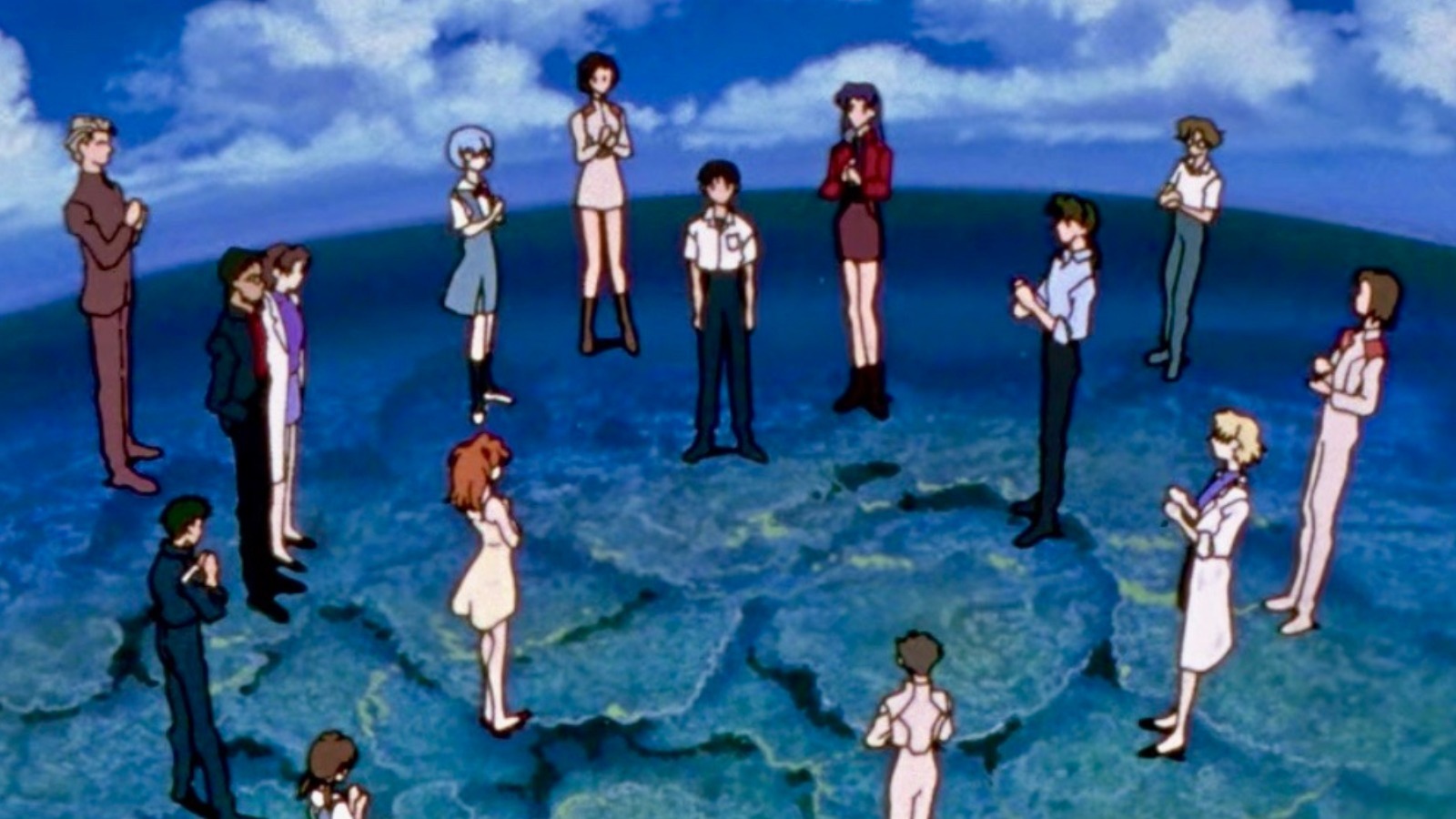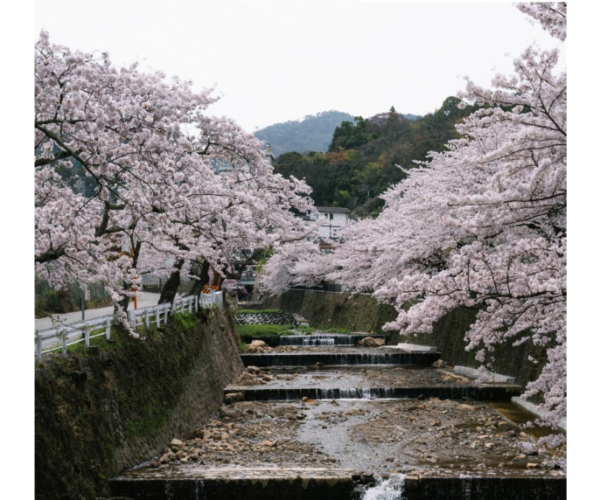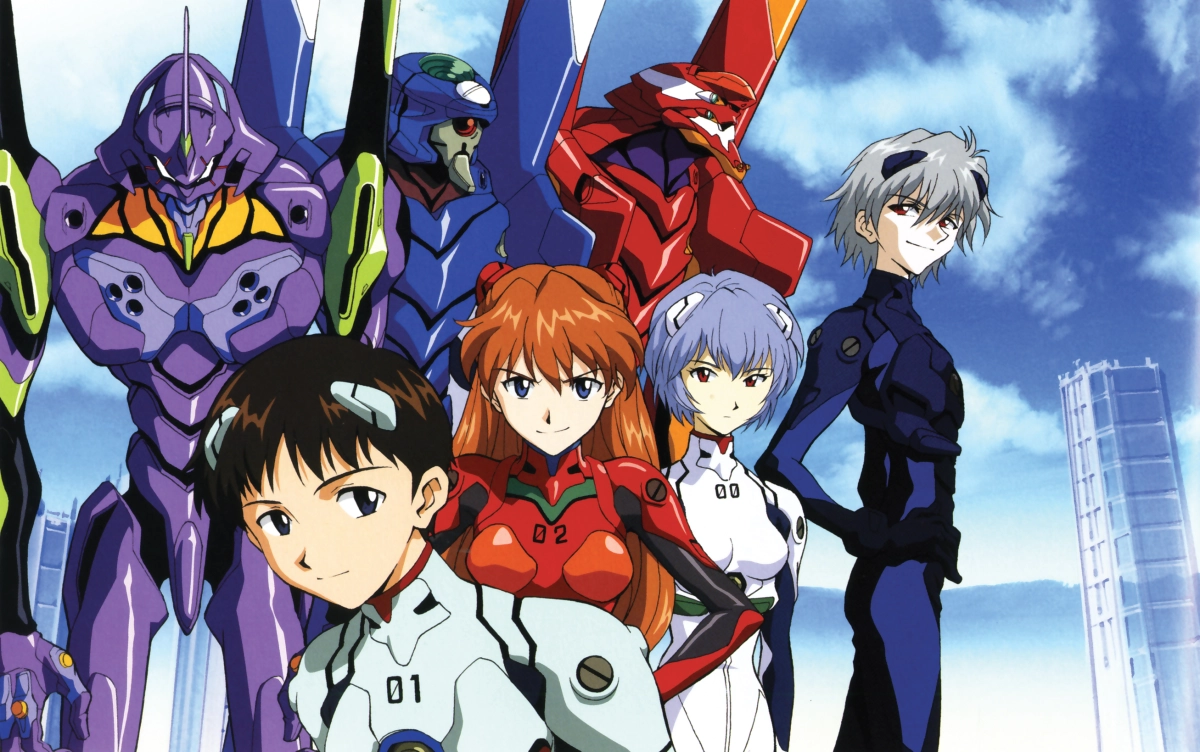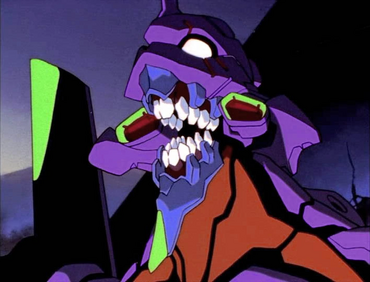As part of a new web original series, Marco Cian sets out to review all of Evangelion. Yes, all of it.
Marco Cian (Hyogo)
Neon Genesis Evangelion is a phenomenon. Like Sherlock Holmes or Gundam, even if you’ve never seen a single episode of the show, you’re probably at least aware of it on some level, due to the sheer ubiquity of media, merch, pastiches, and parodies out there. If I tell my students most of the anime I watched when I was their age, they stare at me blankly, or even gasp at how old I am to have watched such ancient animation. But if I say that I watched Evangelion, my students light up as they gush about their own love of whatever piece of Eva media they first encountered. That is the ubiquity, the longevity, that is enjoyed by Evangelion in Japan, to say nothing of its popularity outside its home country.
Given the sheer scope of NGE’s popularity though, it raises the obvious question “Why cover it here?” What more is there to say about a show that has already been so thoroughly dissected and discussed? What new insight could I, Marco Cian, possibly lend to the series? It certainly is a daunting task, and one that gives me slight trepidation.
And yet, after I recently bit the bullet and watched the last two Rebuild of Evangelion films (something I’d been putting off for some time), the ending of the series left me with a morass of emotions, which I found difficult to process and put into words. Whenever I thought I’d settled on an opinion, some new aspect of the movies would remind me of itself, and my feelings would once again be cast into chaos. The only thought that remained consistent, the one conclusion I was able to come to, was that I needed to go back and explore the whole series. And not just the original tv show and Rebuild films, but everything Eva I could get my hands on. It felt like, if I could just see the full picture of Eva, I might be able to come to terms with its ultimate conclusion.
More than that though, I’m a different person now than I was when I first watched Eva over a decade ago. I’ve changed, my tastes have changed, and perhaps my perspective on NGE has changed in new and interesting ways. It’s certainly something I’m interested in exploring, and as any content creator will tell you, if you’re going to make content out of something, it better be something you’re genuinely interested in.
So, to start out with, let’s take a look at the show that started it all.

Neon Genesis Evangelion
The biggest difficulty I have in reviewing Neon Genesis Evangelion after my rewatch is that I’m not entirely sure if the new insights I’ve gleaned are the result of the Rebuild films being more explicit about things, or the result of my simply having grown older and more perceptive.
Case in point, Shinji’s earbuds. The first time I watched this show, it completely went over my head that Shinji uses the earbuds of his walkman to cloister himself from the world around him. Upon rewatching the show I’m baffled that I could miss this, when it’s so clearly telegraphed on multiple occasions to the audience. But did I notice that now because in the Rebuild films, Gendo flat-out says “Gee, earbuds sure are a great way to cloister yourself from the world around you, huh?” Or did I notice it because I personally have grown up and have used earbuds to cloister myself from the world on occasion (some days you want nothing more than to just listen to an audiobook and not be bothered by people)? I’d like to think it’s the latter, but it’s also possible that without the former I wouldn’t have known to pay attention to that detail.
When I first saw this show (back when I was around Shinji’s age), I honestly was like Spike Spencer in his infamous last episode rant, lost and confused by most of the worldbuilding details to the point where I needed to consult a wiki or have my friends explain the show to me. But now, watching it over a decade later, I found that the details I’d missed were mostly there from the beginning, I just hadn’t noticed them. I say mostly because there is still some important information that isn’t shown in NGE proper, such as the exact genetic makeup of Rei or Eva Unit 01 (and why that’s significant). And while these are nowhere near story-breaking plot holes, they do certainly make things more confusing for the casual viewer.
That being said, NGE is a rich show. I think that’s the only way to describe it, there’s a richness of quality to every aspect of the show, and you want to savor every frame and every line of it. As early as Episode 2, they establish the updated architecture of Tokyo (perhaps a nod to then-recent updates in architecture after the Great Hanshin Earthquake?), ordinary civilians discussing school and job options in the current climate (even in the apocalypse we still have mundane concerns), and a bunch of rich assholes who see armageddon as at best a chance to reap new profits and at worst a disaster they can avoid while the peons suffer (a detail I wish hadn’t aged quite so well). And every episode afterwards is just as rich with new insights into the world and the people who inhabit it.
Of course, no discussion of NGE’s richness is complete without discussing its main character.

Concerning Shinji
Let’s address the elephant in the room. The biggest complaint people who don’t like NGE have, the reason my dad always mocked me for liking this show as a kid, the thing that every Eva fan (myself included) has always apologetically tried to convince those on the fence to overlook about the story is the idea that Shinji is a whiny wimp who does nothing but mope and moan. This is a foundational axiom of the fandom, and one that I myself accepted as a regrettable but forgivable aspect of the show.
Here’s the thing though: it isn’t true.
Perhaps it’s because I’m now seeing this not from the perspective of someone around Shinji’s age, but from the perspective of an adult who has taught kids his age, but from that perspective my thoughts when seeing Shinji express fear and doubt are “Damn, kid’s holding up pretty well, all things considered.” and “Who puts an actual child in a combat situation like this?” It’s true, there are several points in the show where Shinji has mental breakdowns, but he’s a 14-year-old kid thrust into a warzone with no combat training whatsoever (seriously, NERV doesn’t even teach him how to walk in the Eva before they send him out to almost certain death), who is forced to do things that would break most adults as the series progresses. Amuro Ray, Jean-Luc Picard, and even Rambo all go through similar traumas as Shinji, and have similar breakdowns. But do you hear anyone ever say “God, Picard is such a wimp. Why is he whining about his time being assimilated by the Borg? What a loser.” No, and even if you do, no TNG fan would ever humor such a lazy critique.
Even if we do accept that Shinji whines a lot though, you’d have to be blind or deliberately not paying attention to not see that Shinji always manages to come out of his breakdowns stronger and more confident. Shinji at the start of the show and Shinji at the end of the show are two wildly different people, as he becomes a far more outgoing and assertive person after healing old childhood wounds while also dealing with new trials on the battlefield. And yes, even after this progression, Shinji is still prone to triggers and relapses. His mind is still able to come up with new paranoias to stay in a pattern of self-loathing. But no trauma or abuse or fear disappears overnight. And the fears Shinji expresses are fears many of us have, especially those of us who, like Shinji, grew up in an environment where love was conditional. So why do we Eva fans keep trying to placate people who scoff at Shinji’s struggles?
It makes me wonder just what was going on in the late 90s when Evangelion first hit the airwaves that caused so many people to turn on the kid. Neon Genesis Evangelion is a show about trauma, but it’s a show about overcoming that trauma, about pushing through and fighting our demons even if it’s difficult and painful. If characters simply having trauma in the first place is enough to make you hate the series, then I really do not know what to tell you, except, perhaps, that you’re probably the sort to unironically view Rei as an ideal, moe, anime waifu.

The whole problem with that
Rei Ayanami is perhaps the most fascinating character when rewatching NGE, because like Dr. Jekyll and Mr. Hyde, the one thing most people know about her (that she’s an artificial human made by NERV) is presented here as a shocking twist instead of a baseline assumption. Obviously there are hints from the beginning that she’s not quite human, such as the infamous boob grab scene, but it’s still so weird to see NGE try to convince the audience that no, really, Rei is totally a normal human girl who just happens to be expressionless and quiet.
Another jarring aspect of the show, as a direct consequence of this, is that the relationship between Gendo and Rei is initially implied to be a “normal” sexual relationship between a middle-aged man and a 14-year-old girl. Obviously their relationship is revealed to not be of that nature, but it’s still pretty disquieting to see everyone assume that Gendo and Rei are sleeping together, and for the most negative reaction this elicits be jealousy from women who want Gendo for themselves.
Also, even knowing that the relationship between Gendo and Rei is not sexual, it’s still clear that there’s something unsettling going on between the two that we only catch glimpses of. And while NGE openly states that Gendo sees Rei as a replacement for Yui, I don’t think that’s all there is to it. Firstly, if Gendo really valued Rei as much as he valued Yui, he wouldn’t treat her as disposably as he does, a treatment we see clearly in Rei’s literal first appearance. Sure, Gendo burns his hands in an earlier incident to rescue Rei, but as we see more of the man, we realize that he really only cares about Rei if he can control and mold her. Rei then becomes not just a replacement for Yui, but a replacement for Shinji, a child who really is only an extension of their parent, who has no annoying needs or wants of their own that the parent doesn’t want to deal with.
The reason I bring all this up is that I’m surprised this take on Gendo and Rei isn’t more widespread. When Eva fans talk about Gendo, it’s almost exclusively through his relationship with Shinji or Yui. And when Eva fans talk about Rei, it’s almost exclusively through her internal struggles, or shipping conversations. Maybe it’s because the full relationship between Gendo and Rei is only alluded to in the show, but I can’t shake the feeling that I’ve stumbled upon something much deeper, and much darker, than what I initially noticed in my first viewing.
STRUCTURE
Since I’m taking the time to tear down central axioms of the Eva fandom, let me also stick a fork in this toaster by saying that the idea of the show going through distinct and sudden tonal shifts over the course of its run isn’t really accurate. This is another axiom I accepted for the longest time, and one which felt real, when I first watched the show.
For those unaware, the idea is that for the first seven episodes, NGE is very slow-paced and somber, before Asuka shows up in Episode 8 and shifts the tone to that of a more light-hearted comedy. Then in Episode 16, things become surreal and psychedelic, with advertisers pulling out and the budget being reduced. And then finally the last two episodes become a wild fever dream, which leaves most viewers confused and bewildered.
Like I said, that’s what the show felt like when I first watched it years ago. I distinctly remember being disappointed with the first batch of episodes, like… that’s it? This is the show everyone’s been raving about? And when I complained to friends, they all said the same thing. Has Asuka shown up yet? You gotta wait until Asuka shows up. The show doesn’t get good until Asuka shows up. That’s what they said, and sure enough, I didn’t start to enjoy NGE until after Asuka showed up.
However, while the early episodes of the show are slow-paced in the sense that there’s not a battle every episode, and they’re somber in the sense that they take time to establish Shinji’s hang-ups and character, they still manage to tell compact and complete stories in 20 minutes, and there’s plenty of charm and levity to keep things from becoming a slog. I’ll admit, it is possible that because I know how things all end, I’m already hooked and thus don’t think things are dull or dour, but given how rich each episode is, I’m thinking another reason I’m able to enjoy things more easily than I did as a teen is simply that I have deeper expectations than “Big robot punch kaiju smash”. It makes me wonder how many people who dislike Eva are simply holding onto those same expectations.
Also, while Asuka definitely provides a new personality for Shinji to bounce off of, giving him new chances to grow as a person, the groundwork for this development was already laid by his interactions with Misato, Toji, Kensuke, and Rei. Asuka is simply another addition to the mix. Sure, she is someone who wants to be a pilot, in stark contrast to the other two Children. But it’s also very obvious right from the beginning that this enthusiasm stems from a deep, deep insecurity, and she has her own baggage and issues to work through. Asuka may possess a different flavor of richness to the other characters, but she’s still just as complex and nuanced as everyone else.
As for Episode 16? I guess it’s more psychedelic than what we see in previous episodes. As Shinji is trapped inside the body of an Angel and it probes deep into his mind, we see a lot of weird and surreal imagery. But this feels more like a natural progression than a sudden change, with the plot really just being a sci-fi bottle episode, akin to the character studies you’d find in something like Red Dwarf or Breaking Bad. Shinji’s time in the Angel is traumatic, and it causes a breakdown, but the love and support shown by Misato, Rei, and even Asuka once he’s rescued help him recover from his ordeal, and by episode’s end he’s even able to crack a smile, so the main purpose of the episode here seems to simply be showing how much he’s grown as a person.
The only tonal shift I think really is as jarring as people say it is is that between the first twenty-four and last two episodes. And, hoo boy, is that jarring, lemme tell ya.

That Ending
Okay, before we wrap things up, I want to give a brief rundown of what was going on behind the scenes at GAINAX which led to the ending of NGE that we got. Things started out pretty well, with the whole series tightly plotted out by Anno and co. But then midway through production, the Aum Shinrikyo sarin gas attacks forced a hasty rewrite of the final batch of episodes, since their plot was too similar to the real-world tragedy for Anno to feel comfortable with. After this, the production team was racing against the clock, trying to animate as much as they could while keeping to their deadline, and around the halfway mark of the show’s run you can see more and more recycled footage being used. By the end they were cutting it so close that you can see the preview for Episode 24 wasn’t even fully animated in time for Episode 23, and by the time the last two episodes were due, time had caught up to the animators.
What you see in Episodes 25 and 26 of Neon Genesis Evangelion is not the originally intended ending, nor even the rewritten ending, but rather the best ending Anno and co. could put out given the circumstances.
To describe the sensation of watching these last two episodes, I want you to imagine an American football game. The opposing team is at the 10-yard line, they’ve almost got a touchdown. But then suddenly, our team’s quarterback manages to get hold of the ball, and he bolts out towards the other end. He dips and dives, barely avoiding tackles, and then, as he passes the 50-yard line, you think “Oh God. He’s gonna make it.” The opposing team is livid, they’re focusing all their efforts on stopping this man. He’s feeling tired, his muscles are burning, he hasn’t seen his grandma in a while but he keeps running, he keeps going, he’s almost there and then BOOM! Just at the 10-yard line his quads tear like Vince McMahon at Royal Rumble 2005, and he stumbles into the astroturf before being tackled by the opposing team. It’s still impressive. You can’t discount getting the football from one end of the field to another. But it’s not quite a touchdown.
Before these last two episodes, I was honestly willing to give NGE a full 10/10. But after watching them, I’m not so sure anymore. Even leaving aside the ending, I wouldn’t say NGE is flawless. There’s still the kissing scene between Kaji and Misato in an elevator, which was downright skeevy and colored my perceptions of Kaji for a long time. And there’s still the kissing scene between Shinji and Asuka, which made me groan “Come on, dude!” at Shinji’s denseness. Also, I must confess, the full minute of Shinji holding Kaworu did make me chuckle for all the wrong reasons. And yet, these issues all seemed like minor quibbles in the full context of NGE.
Like I said, it’s a rich show, and I wanted to savor every frame and every line I witnessed. The last two episodes though, I didn’t so much want to savor things as I wanted them to slow down. I was able to understand the broad strokes of events, but they were all wrapped up in such surreal psychobabble that it was far more difficult to parse than the events of any other episode. It all left me, ironically enough, with the same morass of emotions I experienced after finishing the Rebuild films!
And yet, maybe this is exactly why Evangelion has had such a cultural impact. Things were so perfect until the ending, and even then the ending didn’t so much ruin things for me as make me simply wish for a redo. I had grown so invested in Shinji and his friends, so in love with these characters and their world, that I wanted to see them get a satisfying conclusion to their stories. I wanted them to get a better ending than the one they got here. And the thing is, I don’t think I’m alone in these feelings, if the mass outpouring of fan disappointment and Anno himself trying another go at the ending a year later is any indication. Whether this End of Evangelion is that satisfying conclusion or not, I’ll have to learn for myself. All I know is that, no matter where it is, I want to find that good ending for Shinji and everyone else. And my search is only just beginning.
Marco Cian is a second-year ALT in Hyogo. You can read more of his stuff (including this series) on his website here.



![CONNECT ART ISSUE 2024 SUBMISSIONS [CLOSED]](https://connect.ajet.net/wp-content/uploads/2024/04/ARTISSUE-INSTA-600x500.png)







1 thought on “The Genesis of Evangelion”
Comments are closed.